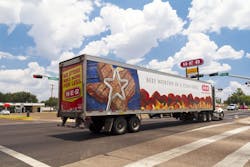In the trucking world, excellence in daily operations — on-time delivery, safety, low costs per mile—has become almost something of a given, especially when you are hauling the foodstuffs that provide the substance for Americans from all walks of life. H-E-B Grocery is one of the largest privately owned grocery store chains in the U.S., with over 350 stores in Texas and northern Mexico. The company, which employs over 100,000 people and garners more than $15 billion in revenue a year, is living proof of how far excellence in logistics and cost control can take you.
Yet it took a devastating hurricane to truly reveal how “excellence” could be taken a whole new level.
Transportation is critical to the operation of any grocery business, much less one of H-E-B’s size and scope. In 2003 it opened a new $4 million, 14,000-sq.-ft. trucking terminal in Weslaco, TX, to help support its far-flung network of stores.That was followed by a warehouse in 2007, a regional dry grocery facility that serves the Rio Grande Valley and South Texas regions. In 2010, they were joined by the Temple Retail Support Center, a 450,000-sq.-ft. warehouse and transportation facility located in the Central Texas region.
All of that goes to support a fleet of 596 tractors and 2,843 trailers — making H-E-B the 76th largest private trucking fleet in the country. And it’s a “green” fleet where possible, too, as the company has successfully reduced diesel fuel consumption by 830,000 gallons a year, used efficiencies designed into its truck wash system to save 1.7 million gallons of water a year, and recycled its used tires into rubber mulch for a variety of community purposes.
But it was the company’s response to Hurricane Harvey that showed a very different kind of transportation moxie. Harvey’s landfall devastated the Houston area, knocking most of H-E-B’s 80 some stores in that area out of commission and flooding three of them so badly they’d have to be rebuilt. But within hours of the storm’s passing, 60 of those 83 grocery stores were up and running, followed by the rest within a few days.
In an interview with LinkedIn, Scott McClelland, a 27-year H-E-B veteran who is president of the chain’s Houston division, explained that achieving that resurgence relied on creative transportation thinking—bypassing distribution centers with direct-truck shipments in order to get the basics, such as water, milk, canned meat, bread, batteries, and, yes, toilet paper, to customers in need.
Many of H-E-B’s Houston-based truck drivers were storm victims like everyone else in the area — with homes destroyed and vehicles wrecked, leaving them unable to get back to work. So, McClelland said, unusual measures were called for, such as flying in truck drivers by helicopter from H-E-B’s San Antonio headquarters to take up the slack.
“Many of our drivers [in Houston] were stuck in their homes or lost their homes. The neck in the funnel, really in our capacity, was to get enough drivers to be able to get our trucks out of the yard and get them delivered,” he explained to LinkedIn
And it could be particularly brutal. In one case, McClelland said Beaumont, TX, needed water because the flooding caused by Harvey tainted the municipality’s supply. But for that mission, it took the 10 trucks dispatched by H-E-B 18 hours to reach their destination; the trip should have taken 90 minutes at most.
McClelland said in his interview that the effort showed by all of H-E-B’s workers in the crisis caused by Harvey — from the clerks to the truck drivers — reaffirmed his belief in what he called “the innate good” in people. “People will rally to a cause to help out their fellow human beings,” he said. “This time, maybe even more so than ever before.”
About the Author
Fleet Owner Staff
Our Editorial Team
Kevin Jones, Editorial Director, Commercial Vehicle Group
Cristina Commendatore, Executive Editor
Scott Achelpohl, Managing Editor
Josh Fisher, Senior Editor
Catharine Conway, Digital Editor
Eric Van Egeren, Art Director
